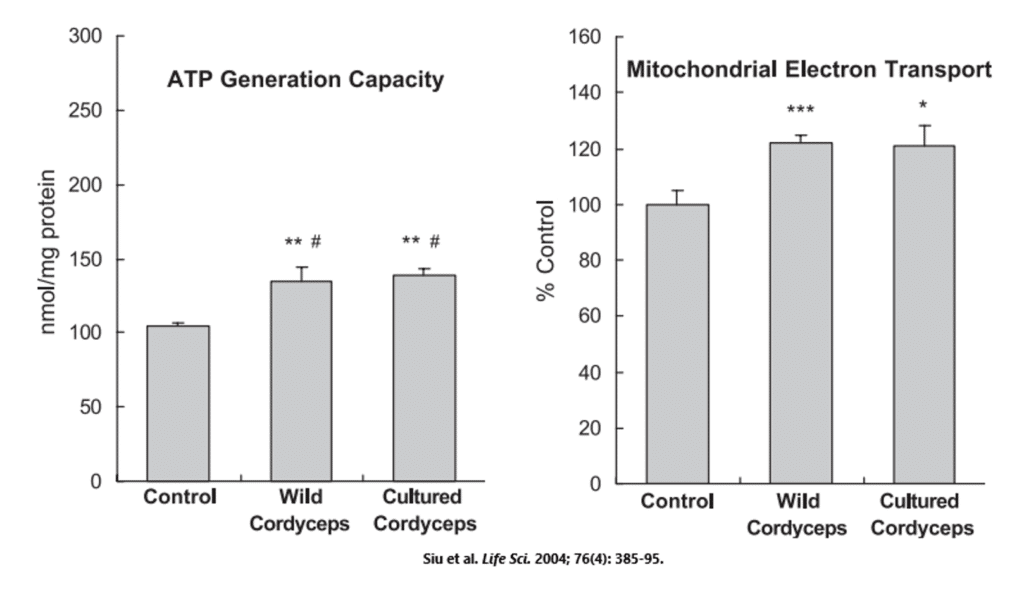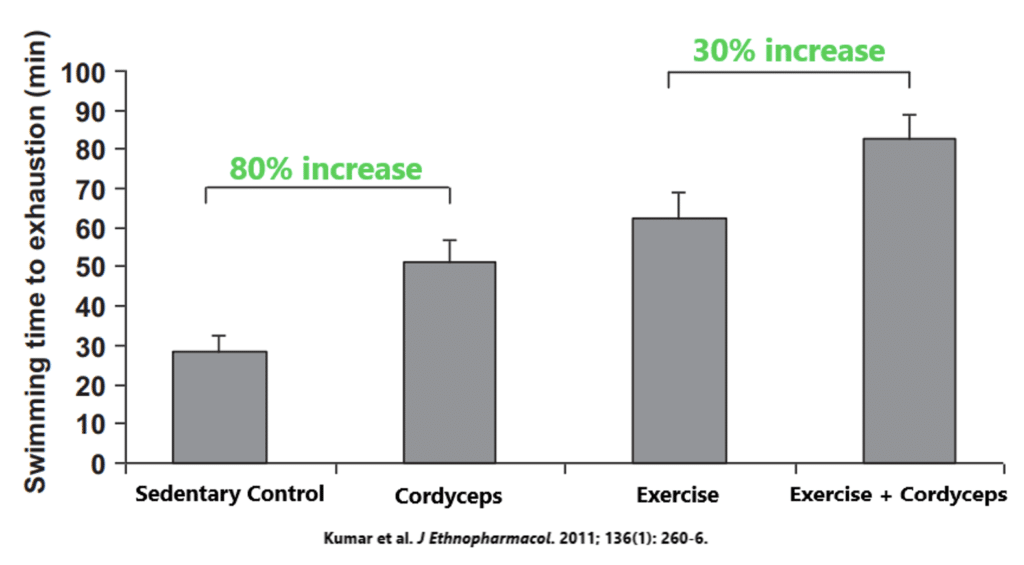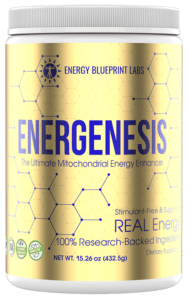Let’s talk about mushrooms. Not the magic kind, but the medicinal. In particular, cordyceps, a parasitic mushroom that feeds on insects and their larvae. It’s climb to fame started with the simple observation of herders that livestock grazing on cordyceps became unusually strong and stout.
That observation manifested into thousands of years of use in traditional Chinese medicine for enhancing vigor and vitality, increasing sexual function, and treating numerous chronic and infectious diseases [1].
Currently, several lines of evidence support a variety of health benefits, such as reducing the risk of metabolic diseases, protecting organ systems, lowering inflammation and oxidative stress, improving immune function, and increasing energy levels [2,3].

Cordyceps Increases Mitochondrial Function and Energy Production
Cordyceps has an impressive list of effects, many of which have roots in the way that cordyceps interacts with our mitochondria. For example, several studies have found that cordyceps supplementation protects against organ damage and dysfunction of the brain, liver, and kidneys by virtue of preserving mitochondrial function and integrity [4–8].
One of the ways it preserves mitochondrial function in the face of harmful conditions is by stimulating the activity of our natural inborn antioxidant enzymes, such as glutathione, superoxide dismutase, and catalase [9,10].
Another way is by increasing mitochondrial oxygen consumption and energy production, which was demonstrated by Chinese researchers after supplementing mice with cordyceps for just three days [11]. Compared to mice that didn’t receive cordyceps, those that did received the supplement presented with a 30% increase in mitochondrial respiration and ATP production.

Cordyceps Increases Endurance
We can see the mitochondrial-enhancing effects through cordyceps’ anti-fatigue abilities. In rats undergoing a swimming exercise routine for two weeks, cordyceps supplementation enhanced swimming endurance by 30% compared to those not taking it [12]. In sedentary rats, the effects were even more pronounced, with cordyceps increasing endurance capacity by 80% relative to the sedentary control.

When the researchers investigated potential mechanisms to explain this benefit, they noted that cordyceps increased the expression of several genes involved in mitochondrial biogenesis and energy production, including AMPK and PGC-1ɑ. There was also an increase in antioxidant signaling and enzyme activity.
These observations were upheld in a later study of mice, with researchers noting that cordyceps improved endurance performance on several different tests, reduced oxidative stress, and increased ATP concentrations in muscle tissue [13].
In humans, there appears to be some benefits as well. While data on young and well-trained athletes is equivocal, studies in elderly adults who have worse mitochondrial function and higher levels of oxidative stress by virtue of being older report 8–13% increases in anaerobic threshold, which represents the point at which mitochondrial respiration can no longer fully support activity levels [14,15].
A meta-analysis of 15 interventions also reported that cordyceps supplementation improved endurance capacity and quality of life in patients with chronic obstructive pulmonary disease (COPD) [16].
Summary
Cordyceps is a parasitic mushroom used for thousands of years in Chinese medicine to restore vigor and vitality. We now know it accomplished this feat through improving mitochondrial function.

References
- Panda AK, Swain KC. Traditional uses and medicinal potential of Cordyceps sinensis of Sikkim. J Ayurveda Integr Med. 2011;2:9–13.
- Tuli HS, Sandhu SS, Sharma AK. Pharmacological and therapeutic potential of Cordyceps with special reference to Cordycepin. 3 Biotech. 2014;4:1–12.
- Ashraf SA, Elkhalifa AEO, Siddiqui AJ, Patel M, Awadelkareem AM, Snoussi M, et al. Cordycepin for Health and Wellbeing: A Potent Bioactive Metabolite of an Entomopathogenic Cordyceps Medicinal Fungus and Its Nutraceutical and Therapeutic Potential. Molecu
- Li X-T, Li H-C, Li C-B, Dou D-Q, Gao M-B. Protective effects on mitochondria and anti-aging activity of polysaccharides from cultivated fruiting bodies of Cordyceps militaris. Am J Chin Med. 2010;38:1093–106.
- Zhang M-H, Pan M-M, Ni H-F, Chen J-F, Xu M, Gong Y-X, et al. [Effect of Cordyceps sinensis powder on renal oxidative stress and mitochondria functions in 5/6 nephrectomized rats]. Zhongguo Zhong Xi Yi Jie He Za Zhi. 2015;35:443–9.
- Takakura K, Ito S, Sonoda J, Tabata K, Shiozaki M, Nagai K, et al. Cordyceps militaris improves the survival of Dahl salt-sensitive hypertensive rats possibly via influences of mitochondria and autophagy functions. Heliyon. 2017;3:e00462.
- Jiang X, Tang P-C, Chen Q, Zhang X, Fan Y-Y, Yu B-C, et al. Cordycepin Exerts Neuroprotective Effects via an Anti-Apoptotic Mechanism based on the Mitochondrial Pathway in a Rotenone-Induced Parkinsonism Rat Model. CNS Neurol Disord Drug Targets. 2019;18:
- Bai X, Tan T-Y, Li Y-X, Li Y, Chen Y-F, Ma R, et al. The protective effect of cordyceps sinensis extract on cerebral ischemic injury via modulating the mitochondrial respiratory chain and inhibiting the mitochondrial apoptotic pathway. Biomed Pharmacother
- Ji D-B, Ye J, Li C-L, Wang Y-H, Zhao J, Cai S-Q. Antiaging effect of Cordyceps sinensis extract. Phytother Res. 2009;23:116–22.
- Xiao J-H, Xiao D-M, Chen D-X, Xiao Y, Liang Z-Q, Zhong J-J. Polysaccharides from the Medicinal Mushroom Cordyceps taii Show Antioxidant and Immunoenhancing Activities in a D-Galactose-Induced Aging Mouse Model. Evid Based Complement Alternat Med. 2012;201
- Siu KM, Mak DHF, Chiu PY, Poon MKT, Du Y, Ko KM. Pharmacological basis of “Yin-nourishing” and “Yang-invigorating” actions of Cordyceps, a Chinese tonifying herb. Life Sci. 2004;76:385–95.
- Kumar R, Negi PS, Singh B, Ilavazhagan G, Bhargava K, Sethy NK. Cordyceps sinensis promotes exercise endurance capacity of rats by activating skeletal muscle metabolic regulators. J Ethnopharmacol. 2011;136:260–6.
- Song J, Wang Y, Teng M, Cai G, Xu H, Guo H, et al. Studies on the Antifatigue Activities of Cordyceps militaris Fruit Body Extract in Mouse Model. Evid Based Complement Alternat Med. 2015;2015:174616.
- Yi X, Xi-zhen H, Jia-shi Z. Randomized double-blind placebo-controlled clinical trial and assessment of fermentation product of Cordyceps sinensis (Cs-4) in enhancing aerobic capacity and respiratory function of the healthy elderly volunteers [Internet].
- Chen S, Li Z, Krochmal R, Abrazado M, Kim W, Cooper CB. Effect of Cs-4 (Cordyceps sinensis) on exercise performance in healthy older subjects: a double-blind, placebo-controlled trial. J Altern Complement Med. 2010;16:585–90.
- Yu X, Mao Y, Shergis JL, Coyle ME, Wu L, Chen Y, et al. Effectiveness and Safety of Oral Cordyceps sinensis on Stable COPD of GOLD Stages 2-3: Systematic Review and Meta-Analysis. Evid Based Complement Alternat Med. 2019;2019:4903671.




